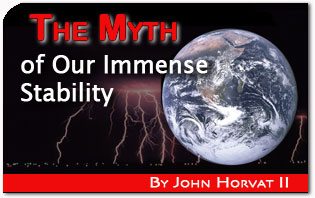 The recent legislative refusal to put same-sex “marriage” on the Massachusetts ballot has prompted some to question the need to oppose any measures involving public morality. After all, they reason, life goes on regardless of the outcome.
The recent legislative refusal to put same-sex “marriage” on the Massachusetts ballot has prompted some to question the need to oppose any measures involving public morality. After all, they reason, life goes on regardless of the outcome.
As one prominent Catholic couple rejoicing over the ballot initiative’s defeat wrote in a Boston Herald editorial: “On May 17, 2004, the day marriage was made legal for everyone in Massachusetts, we looked out our window to see – contrary to apocalyptic predictions – that the sun had actually risen. Life went on quite normally not only that day, but every day since.”1
Indeed, those who defend public morality seem given to apocalyptic predictions. They see dire consequences far into the future that never seem to arrive. And through it all, life goes on. So many appear willing to live and let live as the most horrible aberrant lifestyles co-exist side-by-side with traditional families.
The Issue of Homosexuality
This impression of stability is especially true in the debate over same-sex “marriage” or the acceptance of homosexual behavior. Controversy rages, yet society seems immune to the effects of moral decadence.
There is great opposition to same-sex “marriage” in the United States as evidenced by petitions, amendment votes and other traditional marriage initiatives that have shown an amazing capacity on the part of grassroots activists to stop such “marriages” from becoming law.
However, these efforts face great obstacles. Activists fight a domineering subculture that uses every artifice of manipulation of public opinion to achieve its goals. It challenges and desensitizes Americans, pushing the envelope to ever more shocking levels. And yet through it all, the sun still rises.
Thus, year after year, cities worldwide are the scenes of so-called Gay Pride parades where the most shocking displays offending against Christian morality and public decency are witnessed. It is a situation where unnatural vice is seen as a source of “pride” and these celebrations are but a way to make this pride manifest before all.
The Catholic Position
The gravity of such offenses is aggravated yet more by the Catholic Church’s consistent teaching about homosexuality which could not clash more frontally with this subculture. Not only is the practice of the homosexual act “intrinsically disordered,” as affirms the Catechism, but it is also grievously sinful. Saints, moralists and theologians have reaffirmed the extra gravity of this sin against nature throughout the Church’s 2000 year history.
And yet many Catholics and politicians yielding to this subculture openly defy the Catholic position with apparent and disconcerting impunity. In so doing, they adopt an intimidating attitude toward the Holy See which seeks to make the Church retreat in face of this sin and prevent the Church from accomplishing Her teaching and sanctifying mission.
In fact, it can be observed that, in face of all this controversy, ordinary life in America goes inexorably on. Nothing seems to shake the impression of an immense stability and prosperity that has so dominated American life.
A Real Order of Stability
Such an overwhelming sensation of stability creates the impression of futility in opposing moral deviation. Those who promise fire and brimstone as punishment are always greatly disappointed. Lightning bolts rarely strike down offenders.
That is to say that there is an element of truth in America’s immense stability. It is rooted in the fact that the very order of the Universe is enormously stable and normally does not suffer catastrophic disasters.
Observing the heavens, the personal experience of all is a prodigious order that, since creation, moves with incredible regularity. On its part, the earth mirrors that same regularity in its rotations and the seasons that normally follow their course.
Of course, disasters do happen on earth. However, they are the exceptions and not the rule. Overflowing rivers inevitably return to their banks. Volcanoes return to their slumber. Earthquakes desist in their rattling. In this way, the order of the universe presents an enormous stability to man.

It is only proper that this stability should fill men with respect, admiration and security. God created this stable order for man to feel secure. In His infinite goodness, He wanted all men to have during their short time on Earth this feeling of security that provides the atmosphere for the normal development of the individual and the practice of virtue.
This regularity finds resonance inside man himself. All that is orderly inside man exults seeing the surrounding order of the universe. All the senses feel great joy and well-being, perceiving an order that corresponds to a profound order inside man himself.
Taking Conclusions
From this stability, man comes to understand that, through reason, he can know science which in turn allows man to understand and harness nature to serve him and improve upon his life. Regular objective observance of reality is the basis of all development and true progress of man.
Yet from this observation, one can easily take wrong conclusions.
Based on this stable empirical order, modern materialists developed a technical notion of progress. They reduced the material advantages derived from their understanding of the universe into an end rather than a means.
The stability of reason and science led to the idea of universal progress so much a part of secular modernity. It was a naturalist notion of an order of the universe maintained without God or Faith. From this was deduced the conclusion that progress, despite occasional inconveniences, will never be derailed.
Despite the instability of these post 9/11 times, this attitude still prevails. It is a notion of stability that is based on individual experience; it is little reasoned but profoundly felt.
It is this strong feeling of stability that so confounds the activist who defends public morality and logically reasons that acts have consequences.
Another Notion of Stability
Thus, it is true that the impression of an enormous stability has some basis in reality. However, it is not the entire story.
There is another aspect of this stability that is profoundly reasonable and explains the need to defend public morality.
And that aspect is that the idea of an eternal stability is an illusion. The stable order just described is real but it can also be precarious. It depends on man’s fidelity to God and the natural order He established. It is enough for man to break seriously with this natural order for that stability, which seemed so unshakable, to come tumbling down to the ground.
Examples Given
This is something that can be verified on a personal level. The normal lives of men are stable as long as one makes a reasonable effort to practice virtue. However, that stability is precarious when vice is introduced. By seriously breaking one’s link with virtue, through, for example, the vice of drug addition, stability can easily degenerate into permanent personal disaster. The same can be said for personal adherence to civil law. The minute a person puts himself seriously outside the law, his stability, which seems so unshakable, is lost and his life is precipitated into disorder and drastic change.
And so it is also with morality in society, that is to say, the regulation of free actions with the view of perfecting man’s rational nature. As long as the links with God and the natural order are maintained, one can expect a certain stability. However, the minute that society lets go and seriously gives in to its passions, that order is precarious. It can suddenly come tumbling down with unexpected rapidity toward ruin.
Some might object that moral law is knowable to reason and therefore it is not necessary to be linked to God. However, the Catholic Church has ever affirmed that religion and morality are essentially linked. Without religion, the complete observance of moral law is impossible. This is because part of the moral law prescribes duties to God Himself and helps man sense the obligations imposed by the Divine will. In addition, man’s fallen nature causes him to lack complete control over the passions, thus inclining him to sin, so that, unless supported by Divine aid, man is unable to observe the full moral law for any length of time.
Indeed, once society breaks that precarious link, all things are possible. Scriptures says deep calls unto deep.2 History is full of examples of decadent societies that suddenly crumbled. Empires that seemed undefeatable have been reduced to ruins. It is unreasonable to think that America, which has always assumed that it is immune against disaster, cannot also fall victim to catastrophe.
A Broken Link?
One might further object that the present state of morality has reached such a deplorable state that the precarious link with God and the natural order has already been broken.

While it is true that iniquity appears to reign everywhere, it is also true that things often take a long time to collapse. The human body, for example, can show amazing resilience in resisting years of abuse before finally succumbing to death. So, also societies can be mired in decadence for decades before collapsing.
The fact remains that after long deterioration, there often is a breaking point in the link with the natural order which determines a breakdown.
The Activist’s Role
It is here that the activist is vindicated for defending a higher moral law. He is motivated to fight in view of avoiding an impending danger caused by abandoning morals. While the activist ironically may use apocalyptic imagery, he actually seeks to maintain the link with God and the order He established and thus keep society as a whole from tumbling down.
On a practical level, the effect of sin necessarily is disorder since it places men outside the order proper to his nature. The greater the number and degree of sin, the greater is the concrete effect upon society as a whole.
However, beyond these mere practical considerations, Saint Augustine teaches that man is judged and punished for his sins individually in the afterlife. However since nations have no afterlife, the collective sins of nations are punished on earth.3 Thus, when the sins of nations reach an apogee, God exercises His justice upon them. As Our Lady of Fatima warned, the punishments for sin include war, famine, and the persecution of the Church.
That same God Who is the creator and maintainer of the enormously stable universal order holds that order in a delicate balance depending on the solidity of man’s fidelity to Him.
To the activist, the fact that the sun rises with regularity is not a proof of God’s indifference towards man’s transgressions. Rather, it fills him with admiration and respect for God’s goodness.
However, he has a lively and continuous notion of the precariousness of the order of things. It is the prism through which he interprets events. Mindful of the lessons of history, he is consumed with zeal to maintain the delicate link between God and society and fights tooth and nail to prevent any advance, regardless of how small, that would jeopardize this stability.
Thus, in the present Cultural War, it is not enough to be concerned only with individual sins. The Catholic must work to prevent the nation from abandoning natural and divine law. One must fight to maintain the moral infrastructure of customs, laws and institutions that safeguard public morality.
And when iniquity prevails, the prayers of the faithful must rise up to God asking Divine Aid, imploring His mercy lest that precarious link be severed and that immense and benevolent stability be shattered.
Footnotes
- Peter Meade and Rosanne Bacon Meade, “Social Evolution Starts in Mass.,” Boston Herald, June 12, 2007 at http://news.bostonherald.com/editorial/view.bg?articleid=1005992
- Ps. 41:8
- Cf. St. Augustine, The City of God, atwww.newadvent.org-/fathers/120101.htm., Book I, Chapters 1 and 9. The thesis that nations are rewarded or chastised in this earthly life is an underlying thesis found throughout The City of God, but particularly in Books IV and V.

